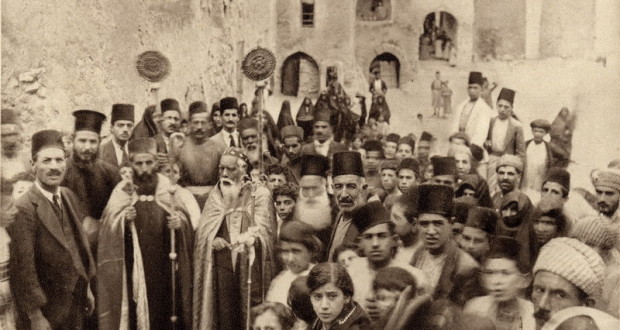By Julie Lenarz and Michael Miner.
15th March 2014, Religion and Politics, Issue 1, No. 1.
The Arab Spring has turned into an Orwellian Winter for the ancient Christian communities of the Middle East. Persecution has reached unprecedented levels and throughout the region Christians are being killed, displaced, tortured, kidnapped, enslaved, and forced to convert. In the weeks after former President Morsi’s downfall in Egypt, Muslim Brotherhood-affiliated protesters and other Islamist groups destroyed almost as many churches as were destroyed in Iraq in the eleven years since the United States led invasion in 2003. The overall situation of Christians in Iraq – only 400,000 remain of a population that numbered 1.5 million prior to the first Gulf War – provides a sense of what a devastating picture this comparison draws.
Nowhere is the danger more acute than in Syria. Once a safe haven for Middle Eastern Christians, long before the rule of the Assads, the country has turned into an abattoir. 500,000 people – roughly a third of Syria’s total Christian population – have already sought refuge in neighbouring Lebanon, Turkey and Jordan or are internally displaced as a result of the on-going civil war. The trend is rising by the day.
Prior to the start of the on-going conflict, Christians lived in relative but fragile and superficial peace under the Assad dictatorship. Their privileged position was based on their unconditional compliance with the regime. Assad himself belongs to the Alawite sect and his government heavily depended on the support of minority groups to control the Sunni majority in Syria. Against that background, Christians are generally regarded as being in favour of the Assad’s survival, as they see him as their best hope for the protection of minorities in the chaotic, sectarian-ridden aftermath of the brutal conflict.
However, this rather oversimplistic analysis of the Assad-Christian relationship is flawed and outdated. Since the beginning of the uprising, the balance of power in the country has shifted and so have important alliances. The Assad regime is now more closely and inextricably tied to the clerical regime in Iran and its proxy Hezbollah in Lebanon. No longer is it as much an allied relationship to balance against Saudi Arabia much as Tehran is an arbiter for survival of the regime. Alongside Russia, they are the most significant players in the preservation of the Assad rule with thousands of Hezbollah forces and Iranian insurgents in the country fighting on behalf of the Assad and Khamenei partnership.
If we consider the abhorrent and inhumane treatment of Christians in Iran and under Hezbollah’s brutal treatment, the thesis that Assad and his backers will safeguard the long-term security of Syria’s Christian community becomes highly problematic. In 2012, a Christian pastor who converted from Islam was sentenced to death for apostasy; last year, four Iranian Christians were condemned to 80 lashes for drinking communion wine; and the UN Special Rapporteur on the Situation of Human Rights in Iran estimates that hundreds of Christians have been arbitrarily arrested. There is little indication there will be any assurances for Christian security. The narrowing of space on the side of the regime is increasingly limited and as the opposition continues to radicalise, there may be nowhere left for Christians to turn to with little or no support on either side of the growing regional conflict.
 Human Security Centre Human Rights and International Security Research
Human Security Centre Human Rights and International Security Research




